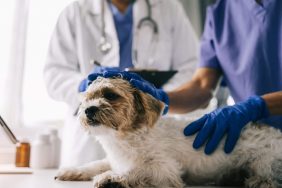
Dogs and humans can get Muscular Dystrophy, an inherited muscular degenerative disease that is caused by a deficiency of a muscle membrane protein called dystrophyin. The disease has shown up in a number of dog breeds, and is somewhat common in Golden Retrievers.
Ringo, a Golden Retriever who inherited a genetic defect that causes muscular dystrophy, didn’t have the disease passed on to him. What makes this unusual is that Ringo was bred to have the mutation that causes this type of disease.
According to a piece in Science News by Tina Hesman Saey, Duchenne muscular dystrophy, an X-linked form of muscular dystrophy affects males — in both dogs and people. Females — in both people and dogs — can get the disease, but it is extremely rare. The illness is caused by a mutation in the largest gene located on the X chromosome, and a protein called dystrophyin is needed to provide structural stability to the cell membrane.
Ringo was healthy, but his siblings, who inherited the same mutation, all tested positive for the disease. They could barely suckle at birth. Ringo’s muscles functioned normally. One of Ringo’s sons also has the mutation but doesn’t have the disease, said Natassia Vieira, a geneticist at Boston Children’s Hospital and Harvard University.
Vieira and her colleagues found that “the dogs without the disease had a second genetic variant that caused their muscles to make more of a protein called Jagged 1. That protein allows muscles to repair themselves. Making more of Jagged 1 appears to compensate for the wasting effect of the muscular dystrophy mutation, although the researchers don’t yet know the exact mechanism.”
“The finding suggests that researchers may one day be able to devise treatments for people with muscular dystrophies by boosting production of Jagged 1 or other muscle repair proteins,” the piece claims.
Sources: Science News









